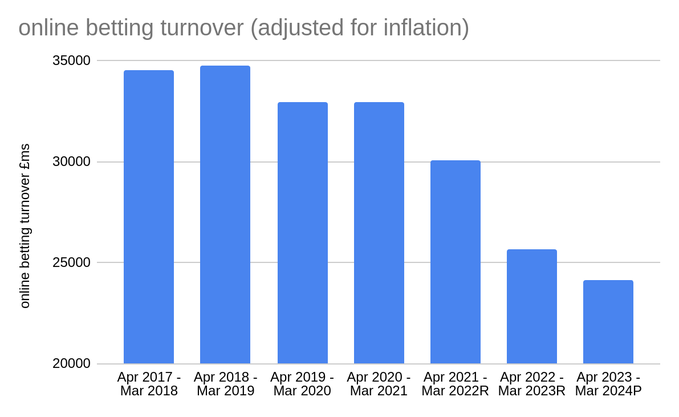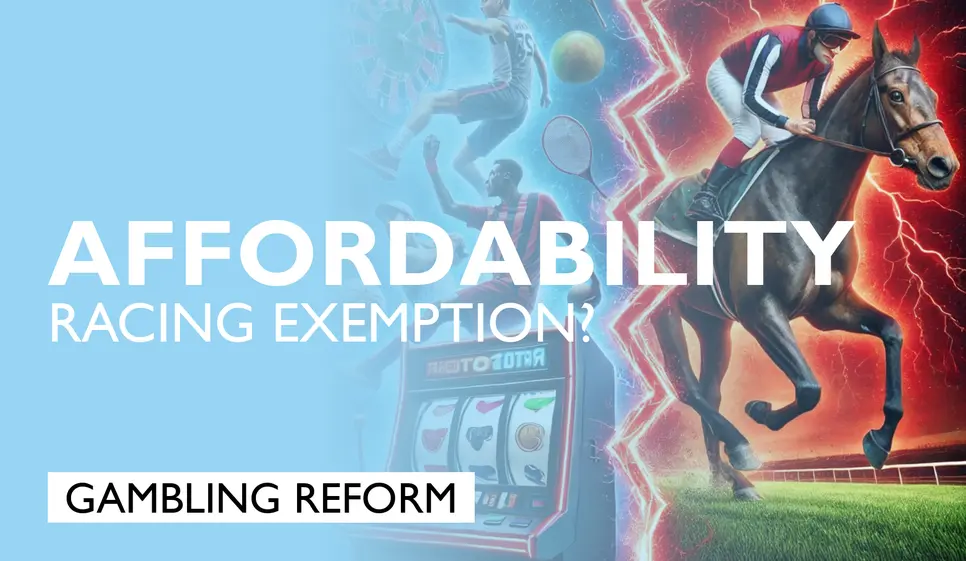In this article some of the potential options to exempt horse racing bets from affordability checks are examined.
British horse racing is reliant on betting and owners to finance the sport.
From 2020 affordability checks have been introduced into the GB gambling market. For years individuals and the racing industry have been concerned about the impact of these checks on the future of horse racing.
Throughout the last few years there have been intermittent calls for horse racing to be exempt from affordability checks. Following reports of a £3bn black hole in horse racing turnover these calls have intensified.
There are four potential options for the way forward.
Option 1 Have a separate wallet for racing bets
This solution would be the simplest to bring in. All the current gambling platforms could still exist.
All horse racing bets would have to be placed from the racing wallet. Deposits to the racing wallet would be exempt from any affordability checks.
Users would have two wallets for their account, one for horse racing bets and one for everything else. Money could not be transferred from between wallets. All horse racing bets would have to be placed from the racing wallet. Deposits to the racing wallet would be exempt from any affordability checks.
The bookmakers might be happy with this solution as it would allow them to keep users on one platform. The cost of having a separate wallet and the growing cost of the horse racing product might make them less likely to keep racing on their platform. Some firms might decide to drop racing all together due to the costs of implementation. This would cost racing in lost revenue.
Punters might bet less on racing due to the hassle of having to deposit and withdraw from a separate wallet and get frustrated they cannot switch funds between wallets.
Gambling reformers and public health officials might object to this because users would still be exposed to other types of gambling when they place racing bets.
Option 2 Different platform for betting and gaming
This option would split skilled and unskilled gambling. Operators could have two online licences; one for online casino and one for online betting.
Online betting would be completely free from affordability checks. Punters could deposit into their online betting account and bet on sports and racing with the same wallet.
Online casinos would be on separate platforms with their own regulations. They could have separate levels of taxation, advertising, betting limits and affordability checks.
Online casinos would be on separate platforms with their own regulations. They could have separate levels of taxation, advertising, betting limits and affordability checks.
There would be no cross selling between betting and gaming, using one platform would not expose a user to the other.
This is likely to be rejected by major operators in the gambling industry who profit from keeping players on one platform.
The gambling reformers are also unlikely to accept this due to their concerns over in-play betting and sports betting in general (see campaigns in the USA against sports betting).
Consumers are likely to be happy with this solution. Those who bet on sports and racing generally just want to be able to gamble in peace. Those who also want to play online slots could still do so but they would have to go to a different platform.
Option 3 Racing has own platform
This would be the most drastic option.
Any operator wanting to offer horse racing bets could do so free from affordability checks if they only offer horse racing. The same exemption as the National Lottery could be given.
Racing itself could directly or indirectly run its own pool betting system and/or exchange. Private bookmakers could also set up to just take horse racing bets.
The big operators would withdraw from offering racing bets or do so on a racing only platform. This is likely to cost racing the majority of its current online revenue.
The big operators would withdraw from offering racing bets or do so on a racing only platform. This is likely to cost racing the majority of its current online revenue.
Another danger of this option for racing is it would be the end of the one stop shop. Racing would not get the benefit of punters that want to bet on multiple different things.
The Hong Kong Jockey Club has a pool monopoly for racing in Hong Kong. In 2003 they launched football betting in order to keep punters betting with them on the same platform. The Tote in the UK now has a sportsbook and casino games. In Australia the NSW Tab also has had sports betting for many years.
The end of the one stop shop could dramatically reduce the revenue for racing due to the lack of cross selling. The punter who starts off betting on football would never see horse racing betting opportunities.
The advantage of being completely separate is the gambling reformers are less likely to reject the proposal at the start.
Option 4 Horse racing and punters to keep calling for end of all affordability checks
The evidence is growing that affordability checks are destroying betting turnover with no tangible benefit for reducing gambling harm.
Online betting turnover is down £8.8bn (27%) since affordability checks started in 2020-2021. This cannot be going unnoticed inside government.

Horse racing and the gambling industry could continue to make the case that this decline cannot continue. More evidence could be gathered to see if this turnover has gone back offshore.
Many in the gambling reform movement are now distancing themselves from intrusive affordability checks.
Many in the gambling reform movement are now distancing themselves from intrusive affordability checks. The idea seemed good to them in theory but the practicalities of them have not worked well.
The argument could be made that GB standing alone from the rest of the world insisting on affordability checks is not working. The end to the all the checks would benefit many bookmakers, gamblers, the racing industry and the tax collectors.
The problem with this approach is it may take too long to happen. Many punters are getting frustrated with the checks and either giving up betting or moving to the non licensed market.
Conclusion
Exempting horse racing from affordability checks is appealing to the many racing punters frustrated by the checks. On the surface the concept has some merit.
The different options all have positives and negatives.
There is little point in removing racing bets from affordability checks if customers are still asked for documentation for AML reasons.
The elephant in the room is AML checks. There is little point in removing racing bets from affordability checks if customers are still asked for documentation for AML reasons. Racing would be risking asking for big changes that would potentially lose revenue in return for AML checks continuing anyway.
The first three options all involve big structural changes. They would take time and money to implement. This would reduce the number of operators offering racing bets and the opportunities punters have to bet on racing.
There is no guarantee that racing bets would not be subject to more regulation in the future. By choosing to go it alone racing will lose the backing of the gambling industry lobby and punters interested in betting beyond racing.
If those suffering from gambling harm flock to racing, where no checks exist, the gambling reformers could claim in future betting on horse racing is more harmful.
If those suffering from gambling harm flock to racing, where no checks exist, the gambling reformers could claim in future betting on horse racing is more harmful. They could then return and press for more regulation and the return of checks for racing punters.
My personal suggestion is for the punters and the racing industry to keep pushing for affordability checks to be removed from all gambling.
Gambling is a 'normal' activity that brings joy to millions of people each month without any harm. Gamblers and the racing industry should not side with those who suggest gambling is a public health issue that needs a huge level of intrusive regulation. Curbs on the freedom of the individual to spend their own money as they wish should not apply regardless on if someone gambles on horse racing, greyhound racing, sports or casino games.
____________________
- Get in touch with Chris on X.
- Learn how David used the SharpBetting football system to win £8,000 in 100 hours of activity here.
- See how Leah went from novice to £7,500 profit using the system here.
- Watch Chris discuss winning over £100,000 from the football system in detail here.
- Join our 10,000 SharpBetting followers on X.



